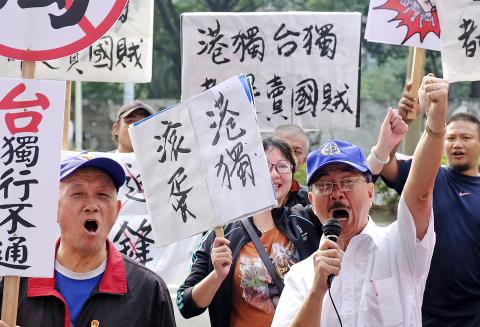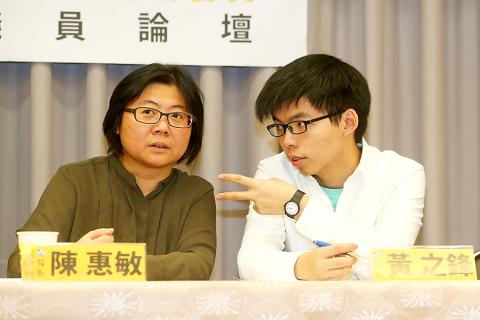Several people wearing masks confronted pro-localization Hong Kong lawmakers who arrived in Taipei in the wee hours of the morning yesterday, sparking allegations of an attempt by the Chinese Communist Party (CCP) to interfere with their meetings in Taiwan.
Hong Kong lawmakers Edward Yiu (姚松炎), Nathan Law (羅冠聰) and Eddie Chu (朱凱迪) arrived at Taiwan Taoyuan International Airport after midnight and were confronted by more than 100 protesters associated with the pro-unification Patriot Association.
Several people wearing masks and black clothes rushed toward the lawmakers as they walked into the airport lobby, shouting at them to leave Taiwan, before a police escort held them back, allowing the lawmakers to make their way to a waiting car.

Photo: AFP / Sam YEH
The incident raised suspicions of CCP involvement to hamper planned exchanges between the lawmakers and the New Power Party (NPP), which invited them to participate in two political forums over the weekend.
“That there would be an attempted assault on Hong Kong legislators when they arrived is quite extreme. I can understand why the CCP is worried about exchanges between Taiwan and Hong Kong, but they should go back and re-examine the cause. The actions of the CCP is the reason there has been so much understanding between Hong Kong and Taiwanese groups in recent years,” said Lin Fei-fan (林飛帆), a prominent Sunflower movement activist, who said he drove the lawmakers to Taipei.
The Patriot Association is widely seen as sympathetic to the CCP and has a history of violent confrontation, most recently attacking Falun Gong practitioners outside the Taipei 101 building.

Photo: CNA
The China Unification Promotion Party (CUPP) has been tied to the Bamboo Union (竹聯幫) crime syndicate, and Lin yesterday accused the Four Seas Gang (四海幫) of also being involved.
More than 300 demonstrators from the CUPP and other groups yesterday protested outside the NPP forum, which was guarded by rows of police officers and barricades blocking the main entrance of the building in Taipei.
Protesters waved signs they said showed a fist smashing into a “Hong Kong-Taiwanese independence alliance.”
Police escorted the lawmakers into the building.
CUPP vice chairman Tseng Cheng-hsing (曾正星) said the protest was intended to “intimidate” the lawmakers and ensure “they do not come back again.”
“Similar protests have taken place in Hong Kong and it is obvious that the CCP has been trying to manipulate patriotic feelings and pin labels on us,” said Law, who denied he supported Hong Kong independence, but promised exchanges with Taiwan would continue.
“Last night was a bit extreme, but it reflected just how low the character of those who oppose exchanges are,” said Joshua Wong (黃之鋒), a Hong Kong activist who is secretary-general of Demosisto, Law’s political party.
Separately, Taipei Mayor Ko Wen-je (柯文哲) yesterday condemned an attempted assault on Wong, saying that violence is not the way to voice opinions in a civilized society.
“I have asked the Taipei Police Department to protect our guests,” he said.
The mayor said the incident could have provided an explanation for why, after the benefits Beijing has given Taiwan, Taiwanese have always been more affiliated with the US than with China.
“Why do Taiwanese fear China so much? I think this is a question Beijing should think about,” he said.
Additional reporting by Peng Wan-hsin and Sean Lin

The CIA has a message for Chinese government officials worried about their place in Chinese President Xi Jinping’s (習近平) government: Come work with us. The agency released two Mandarin-language videos on social media on Thursday inviting disgruntled officials to contact the CIA. The recruitment videos posted on YouTube and X racked up more than 5 million views combined in their first day. The outreach comes as CIA Director John Ratcliffe has vowed to boost the agency’s use of intelligence from human sources and its focus on China, which has recently targeted US officials with its own espionage operations. The videos are “aimed at

STEADFAST FRIEND: The bills encourage increased Taiwan-US engagement and address China’s distortion of UN Resolution 2758 to isolate Taiwan internationally The Presidential Office yesterday thanked the US House of Representatives for unanimously passing two Taiwan-related bills highlighting its solid support for Taiwan’s democracy and global participation, and for deepening bilateral relations. One of the bills, the Taiwan Assurance Implementation Act, requires the US Department of State to periodically review its guidelines for engagement with Taiwan, and report to the US Congress on the guidelines and plans to lift self-imposed limitations on US-Taiwan engagement. The other bill is the Taiwan International Solidarity Act, which clarifies that UN Resolution 2758 does not address the issue of the representation of Taiwan or its people in

US Indo-Pacific Commander Admiral Samuel Paparo on Friday expressed concern over the rate at which China is diversifying its military exercises, the Financial Times (FT) reported on Saturday. “The rates of change on the depth and breadth of their exercises is the one non-linear effect that I’ve seen in the last year that wakes me up at night or keeps me up at night,” Paparo was quoted by FT as saying while attending the annual Sedona Forum at the McCain Institute in Arizona. Paparo also expressed concern over the speed with which China was expanding its military. While the US

SHIFT: Taiwan’s better-than-expected first-quarter GDP and signs of weakness in the US have driven global capital back to emerging markets, the central bank head said The central bank yesterday blamed market speculation for the steep rise in the local currency, and urged exporters and financial institutions to stay calm and stop panic sell-offs to avoid hurting their own profitability. The nation’s top monetary policymaker said that it would step in, if necessary, to maintain order and stability in the foreign exchange market. The remarks came as the NT dollar yesterday closed up NT$0.919 to NT$30.145 against the US dollar in Taipei trading, after rising as high as NT$29.59 in intraday trading. The local currency has surged 5.85 percent against the greenback over the past two sessions, central